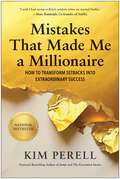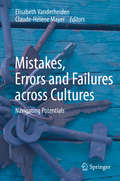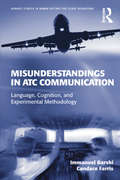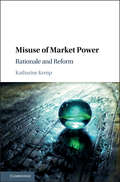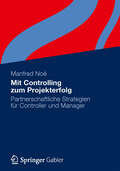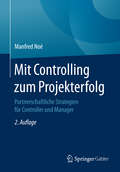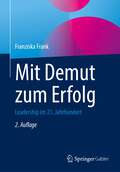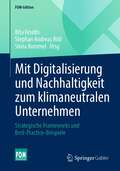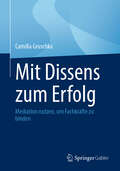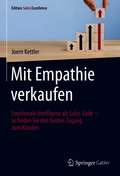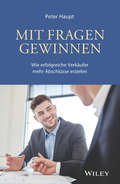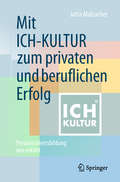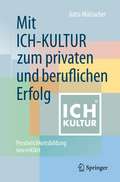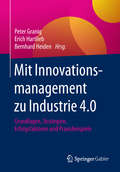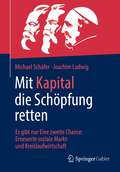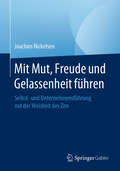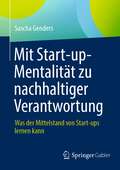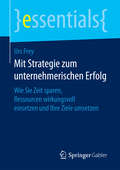- Table View
- List View
Mistakes that Made Me a Millionaire: How to Transform Setbacks into Extraordinary Success
by Kim PerellAre you ready to turn your mistakes into millions and fast-track your way to success? Mistakes That Made Me a Millionaire is your permission slip to fail forward, dream bigger, and discover that behind every mistake is a million-dollar lesson. Through powerful stories, proven strategies, and real-world advice, self-made millionaire Kim Perell reveals the untold truth: Success is built in the messy middle, between your worst moments and your best decisions. Ten chapters. Ten mistakes. Ten secrets no millionaire talks about—until now. In these pages, you will learn: How to stop playing small, overcome imposter syndrome, and own your success The mindset shift that turns mistakes into million-dollar lessons The ultimate tool kit for handling mistakes and setbacks How to remove barriers to take your professional career to the next level The secret to unlocking the power of relationships to multiply your success Whether you&’re an entrepreneur, aspiring leader, high-achieving professional, executive climbing the corporate ladder, or starting your next big chapter—these lessons will meet you where you are and take you where you want to go. Kim&’s tenacious and triumphant story serves as an essential guide to elevate your leadership, empower your teams, and embrace life&’s toughest challenges. Mistakes That Made Me a Millionaire is a must-read master class from a world-class entrepreneur.
Mistakes, Errors and Failures across Cultures: Navigating Potentials
by Elisabeth Vanderheiden Claude-Hélène MayerThis volume provides comprehensible, strength-based perspectives on contemporary research and practice related to navigating mistakes, errors and failures across cultures. It addresses these concepts across cultural contexts and explores any or all of these three concepts from a positive psychology or positive organisational perspective, highlighting their potential as resources. The volume further discusses the consequences of errors and failures at individual, organisational and societal levels, ranging from severe personal problems to organisational and collective crises, perspectives how those can be turned into opportunities for contingent and sustainable improvement processes. The book shows that there are significant cultural differences in the understanding, interpretation and handling of errors and failures. This volume provides practical guidance for transcultural understanding of mistakes, errors and failure through new models, ideas for self-reflection, therapeutic and counselling interventions and organisational change management processes. This book is a must for researchers and practitioners working on mistakes, errors and failures across cultures and disciplines!
Misunderstandings in ATC Communication: Language, Cognition, and Experimental Methodology (Ashgate Studies in Human Factors for Flight Operations)
by Candace Farris Immanuel BarshiEffective radio communication between ATC and pilots has long been recognized as an important element of aviation safety. In recognition of the role miscommunications play in aviation incidents and accidents, the International Civil Aviation Organization (ICAO) recently introduced language proficiency requirements for all flight personnel in all ICAO member states. Using an effective and economical experimental paradigm, the research described here teases apart the complex combination of factors (e.g. speech rate, controller message length, English language proficiency, cognitive workload) believed to contribute to miscommunications between controllers and pilots. Misunderstandings in ATC Communication offers an in-depth report of a seminal study in aviation communication, which until now has only been available in the form of an unpublished dissertation. In addition, it offers a recent extension of that work, the authors’ reflections on the research process, and a thorough review of the aviation communication literature. Graduate students and researchers who wish to address real-world problems will appreciate the simple elegance of the experimental paradigm that has been used to address a wide range of theoretical and applied interdisciplinary research questions. The book will appeal to scholars in the fields of human factors, linguistics, cognitive psychology, applied linguistics and second-language education and assessment. It is also of direct relevance to government and industry decision-makers and operators as they strive to implement the ICAO requirements, and to improve aviation safety.
Misuse of Market Power: Rationale and Reform
by Katharine KempLaws prohibiting unilateral anticompetitive conduct have been the subject of vigorous international debate for decades, as policymakers, antitrust scholars and agencies continue to disagree over how best to regulate the market conduct of a single firm with substantial market power. Katharine Kemp describes the controversy over Australia's misuse of market power laws in recent years, which mirrored the international debate in this sphere, and culminated in the fundamental reform of the misuse of market power prohibition under the Competition and Consumer Act 2010 (Cth) in 2017. Misuse of Market Power: Rationale and Reform explains Australia's new misuse of market power law, which adopts an 'effects-based test' for unilateral conduct, and makes a comparative analysis between Australian tests for unilateral anticompetitive conduct and tests from the US and the EU. This text also illuminates the frequently mentioned, but little understood, concept of 'purpose' and its role in framing unilateral conduct standards.
Mit Charisma aus der Krise: Zuversichtlich und zuverlässig Zukunft gestalten (essentials)
by Ronald Deckert Hendrik MüllerGroße Herausforderungen planetaren Ausmaßes legen es nahe, auch historisch verankerte Wissens- und Erfahrungsschätze der Menschheit zu nutzen. Zentriert um den Begriff Charisma finden sich in diesem essential einordnende Gedanken und Hinweise, die dafür nützlich sein können, Menschen in Richtung nachhaltiger Entwicklung mitzunehmen.
Mit Controlling zum Projekterfolg
by Manfred NoéDas projektbegleitende Controlling (pC) übernimmt eine zentrale Aufgabe innerhalb eines Projekts. Durch Planung, Kontrolle, Analyse und Steuerung trägt das projektbegleitende Controlling entscheidend zur erfolgreichen Umsetzung bei. Hierfür muss es aber von Anfang an, also bereits in der Planungsphase, in das Projekt integriert werden. Anhand von zahlreichen Beispielen und Hinweisen aus der Praxis sowie Checklisten und Abbildungen wird anschaulich dargestellt, wie Controllinginstrumente in Projekten eingesetzt werden können. Mit Aufgaben und Lösungen ist das Werk auch zum Selbststudium geeignet.
Mit Controlling zum Projekterfolg: Partnerschaftliche Strategien für Controller und Manager
by Manfred NoéDas projektbegleitende Controlling (pC) übernimmt eine zentrale Aufgabe innerhalb eines Projekts. Dieses Buch zeigt, wie durch Planung, Kontrolle, Analyse und Steuerung mit projektbegleitendem Controlling die erfolgreiche Umsetzung gelingt. Anhand von zahlreichen Beispielen und Hinweisen aus der Praxis sowie Checklisten und Abbildungen wird anschaulich dargestellt, wie Controllinginstrumente in Projekten eingesetzt werden können. Wichtig ist dabei, dass das projektbegleitende Controlling von Anfang an, also bereits in der Planungsphase, in das Projekt integriert wird. Mit Aufgaben und Lösungen ist das Werk auch zum Selbststudium geeignet.
Mit Daten überzeugen, mit Geschichten inspirieren: Data Storytelling im Projektmanagement
by Friederike OehlerkingGerade in Unternehmen und insbesondere im Projektmanagement stecken wir in einem Konflikt: Auf der einen Seite müssen wir auf Basis von Erkenntnissen aus Datenanalysen Geschäftsentscheidungen treffen. Für die Analysen selbst steigen wir in die Details unserer Datenseen 4.0 ab. Aber wenn wir auftauchen und es unserem Management als Entscheidungsvorlage präsentieren wollen, scheitern wir genau an diesen Details. Warum? Weil die Gehirne unserer Zuhörer:innen bei zu vielen trockenen Fakten abschalten. Data Storytelling löst dieses Problem. Denn unser Gehirn reagiert auf Geschichten besser als auf eine Auflistung von reinen Zahlen. Beim Data Storytelling werden die Daten zusammen mit einer grafisch leicht verständlichen Darstellung und einem spannenden Narrativ aufbereitet. Der sonst übliche Informationsüberfluss wird auf wesentliche und relevante Kernaussagen reduziert. So werden Inhalte verständlicher und bilden die Grundlage für Geschäftsentscheidungen. Gespickt mit wissenschaftlichen Fakten über unser Gehirn und „Veteranengeschichten“ aus dem Projektmanagement werden in diesem Buch Wege aufgezeigt, dem „Death-by-PowerPoint“ den Kampf anzusagen und die Welt von schlechten Präsentationen zu befreien.Der InhaltWas ist Data Storytelling?Projekt, Kommunikation und PräsentationenSchritte des Data Storytellings: Zuhörer:innen, Aha-Moment, Storyboard, SpannungsbogenVisualisierung: präattentive Merkmale, Gestaltprinzipien, Foliendesign, Daten- und Präsentationsvisualisierung
Mit Demut zum Erfolg: Leadership im 21. Jahrhundert
by Franziska FrankDieses Buch ist sowohl ein Plädoyer für Demut als wichtige Führungskompetenz für das 21. Jahrhundert als auch ein Augenöffner dafür, was Demut erreichen kann: für die Mitarbeiter, das Unternehmen und die Führungskraft selbst. Bislang ist Demut eine Rarität im Management. Um den Erfolg des Unternehmens im kommenden Zeitalter sicherzustellen, um Mitarbeiter zu halten und zu motivieren und um selbst als Führungskraft stabil zu bleiben, muss sich das ändern, denn nur mit reduziertem Ego können Führungskräfte den Wandel im 21. Jahrhundert meistern.Mit Demut lassen Führungskräfte eine neue Kultur ins Unternehmen einziehen: Wo heute viele Führungskräfte ohne Anerkennung, mit fehlendem Respekt und unkontrolliertem Verhalten agieren, zieht eine Professionalität ein, die mit Klarheit und Wärme die Mitarbeiter in schwierigen Zeiten stärkt und führt. Mit Demut können Führungskräfte ihre Stärken und Schwächen erkennen, das eigene Ego im Griff halten und andere für das anerkennen was sie sind und sein können. Das Buch ist wissenschaftlich fundiert sowie praxisrelevant für den beruflichen Alltag von Unternehmern und Führungskräften – vom Teamleiter bis zum Topmanager. Es enthält zahlreiche Fallbeispiele aus der Unternehmenswelt, eigene Erfahrungen der Autorin aus der Beratung und Lehre, Zahlen, Daten, Fakten sowie wissenschaftliche Studien zur Wirksamkeit von Demut als Führungskompetenz. Die Autorin zeigt, wie sich Demut messen lässt und wie sich der bewusste Einsatz von Demut positiv auf die gesamte Organisation, die Mitarbeiter und die Führungskraft selbst auswirkt.Aus dem InhaltWo stehen wir in Sachen Demut heute?Definition von Demut für den UnternehmensalltagWas bringt Demut den Mitarbeitern, dem Unternehmen, der Führungskraft: z.B. mehr Leistung, erfolgreichere Strategie, bessere KulturBereitschaft, die eigenen Stärken und Schwächen zu erkennenStärken anderer wahrnehmenLernfähigkeit bzw. Offenheit für neue Ideen und FeedbackDas große Ganze sehenDie Grenzen und Nachteile von DemutBeispiele von Demut als Inspiration
Mit Demut zum Erfolg: Leadership im 21. Jahrhundert
by Franziska FrankDieses Buch ist sowohl ein Plädoyer für Demut als wichtige Führungskompetenz für das 21. Jahrhundert als auch ein Augenöffner dafür, was Demut erreichen kann: für die Mitarbeiter, das Unternehmen und die Führungskraft selbst. Bislang ist Demut eine Rarität im Management. Um den Erfolg des Unternehmens im kommenden Zeitalter sicherzustellen, um Mitarbeiter zu halten und zu motivieren und um selbst als Führungskraft stabil zu bleiben, muss sich das ändern, denn nur mit reduziertem Ego können Führungskräfte den Wandel im 21. Jahrhundert meistern.Mit Demut lassen Führungskräfte eine neue Kultur ins Unternehmen einziehen: Wo heute viele Führungskräfte ohne Anerkennung, mit fehlendem Respekt und unkontrolliertem Verhalten agieren, zieht eine Professionalität ein, die mit Klarheit und Wärme die Mitarbeiter in schwierigen Zeiten stärkt und führt. Mit Demut können Führungskräfte ihre Stärken und Schwächen erkennen, das eigene Ego im Griff halten und andere für das anerkennen was sie sind und sein können. Das Buch ist wissenschaftlich fundiert sowie praxisrelevant für den beruflichen Alltag von Unternehmern und Führungskräften – vom Teamleiter bis zum Topmanager. Es enthält zahlreiche Fallbeispiele aus der Unternehmenswelt, eigene Erfahrungen der Autorin aus der Beratung und Lehre, Zahlen, Daten, Fakten sowie wissenschaftliche Studien zur Wirksamkeit von Demut als Führungskompetenz. Die Autorin zeigt, wie sich Demut messen lässt und wie sich der bewusste Einsatz von Demut positiv auf die gesamte Organisation, die Mitarbeiter und die Führungskraft selbst auswirkt.Aus dem InhaltWo stehen wir in Sachen Demut heute?Definition von Demut für den UnternehmensalltagWas bringt Demut den Mitarbeitern, dem Unternehmen, der Führungskraft: z.B. mehr Leistung, erfolgreichere Strategie, bessere KulturBereitschaft, die eigenen Stärken und Schwächen zu erkennenStärken anderer wahrnehmenLernfähigkeit bzw. Offenheit für neue Ideen und FeedbackDas große Ganze sehenDie Grenzen und Nachteile von DemutBeispiele von Demut als Inspiration
Mit Digitalisierung und Nachhaltigkeit zum klimaneutralen Unternehmen: Strategische Frameworks und Best-Practice-Beispiele (FOM-Edition)
by Bita Fesidis Stephan Andreas Röß Silvia RummelDas Buch zeigt anhand von strategischen Frameworks sowie Best-Practice-Beispielen, wie Unternehmen durch die Nutzung von Digitalisierung ihre Nachhaltigkeitsstrategie positiv beeinflussen können. Dabei wird nicht nur der Umgang mit politischen Rahmenbedingungen berücksichtigt, sondern es werden auch Transformationspfade von Organisationen und Prozessen sowie die Einführung neuer Methoden, Kooperationen und datengetriebener Geschäftsmodelle beschrieben. Die Autorinnen und Autoren zeigen, welchen Chancen, Risiken und Perspektiven Unternehmen in der Auseinandersetzung mit Digitalisierung und Nachhaltigkeit gegenüberstehen und wie mit diesen umgegangen werden kann. Denn die Wirtschaft steht in den nächsten Jahrzehnten vor extremen Herausforderungen: Nachhaltigkeit und Biodiversität in all ihren Facetten werden Unternehmen zum Umdenken zwingen und radikale Veränderungen erfordern. Ein wichtiges Zwischenziel stellt die Erreichung der hundertprozentigen Klimaneutralität bis 2050 dar. Um dies zu erreichen, sind Transformationsprozesse in allen Wirtschaftsbereichen erforderlich. Megatrends wie die Nachhaltigkeit und Konnektivität treffen aufeinander und bestärken sich gegenseitig. Diese beiden Themenkomplexe gemeinsam zu denken, bietet Potenzial für innovative Dienstleistungen, Produkte und Lösungen für eine klimaneutrale Zukunft.Der InhaltVeränderung der Rahmenbedingungen und soziokulturelle EinflüsseHarmonisierung der Transformationspfade von Nachhaltigkeit und DigitalisierungMethoden für Nachhaltigkeits- und DigitalisierungsmanagementDigitale nachhaltige Geschäftsmodelle und Innovation
Mit Dissens zum Erfolg: Mediation nutzen, um Fachkräfte zu binden
by Camilla GruschkaMit diesem Fachbuch eröffnet die Autorin einen neuen Blick auf den Zusammenhang von Konflikten in Unternehmen, Unternehmenserfolg, Fachkräftebindung sowie dem Einsatz von Mediation. Ignorierte Konflikte kosten Unternehmen nicht nur viel Geld und generieren eine ungesunde Organisationskultur, sondern können auch dafür sorgen, dass wichtige, qualifizierte Mitarbeiter:innen ihre Arbeitsmotivation verlieren und das Unternehmen verlassen. Dissens am Arbeitsplatz ist wichtig, aber auf das Wie kommt es an: Unternehmen mit einer guten Streitkultur sind gesünder, innovativer, haben eine höhere Mitarbeiterzufriedenheit und eine deutlich niedrigere Fluktuationsrate. Mit einer positiven Sicht auf Meinungsverschiedenheiten und Wissen über Mediation können Menschen mit Einfluss und Entscheidungsbefugnissen wirksamer zu einer konstruktiven Streitkultur beitragen. Konflikte sind wertvoll und gehören zum produktiven Arbeiten. Dieses Buch hilft den Leser:innen, Konflikte aus der Tabu-Zone nutzbringend zu befreien und stärkt ihre Kommunikations- und Konfliktlösungskompetenzen. Es eröffnet neue Perspektiven, gibt einen Einblick in die Möglichkeiten der Mediation sowie praxisnahe Denk- und Handlungsimpulse für Menschen in Führungspositionen. Interviews mit Mediations-Expert:innen und Erfahrungsberichte der Autorin geben einen Einblick in die Praxis. Der Inhalt Dissens, Streitkultur und Erfolg Bindung von Fachkräften Preis der Ignoranz: Konfliktkosten Mediation schöpft Kraft Neue Welten entstehen
Mit Empathie verkaufen: Emotionale Intelligenz als Sales-Code – so finden Sie den besten Zugang zum Kunden (Edition Sales Excellence)
by Joern KettlerIn diesem Buch erfahren Sie, wie Sie die Emotionen in der Körpersprache Ihrer Kunden zuverlässig lesen und interpretieren können, um besser und leichter zu verkaufen. Die Kunst des empathischen Verkaufens wird Ihnen den Weg ebnen, um das Vertrauen Ihrer Kunden zu gewinnen und sie schneller zum Abschluss zu führen. Anschaulich und speziell auf die Belange im Verkauf zugeschnitten vermittelt Ihnen Joern Kettler die Werkzeuge der Mimikresonanz®-Methode. Dieses Modell hilft Ihnen, Warn- oder Einwandsignale, aber auch Wunschsignale Ihres Kunden sicher zu erkennen und als Leitfaden im Verkaufsgespräch gewinnbringend zu nutzen. Voraussetzung für den Abschluss ist allerdings, dass Sie die wahrgenommenen Emotionen auch ansprechen und nicht den Eindruck erwecken, als würden Sie mit Tricks und Kniffen arbeiten. Das Ergebnis: ein einzigartiges und nachhaltiges Vertrauensverhältnis Ihres Kunden zu Ihnen als Verkaufsberater.Das Buch ist der ideale Begleiter für einen achtsamen und authentischen Zugang zum Kunden. Mit praxisbewährten Tipps und Ideen, illustriert mit zahlreichen Fotos und einer Übersicht über alle nonverbalen Botschaften, die Sie für ein empathisches Verkaufen erkennen müssen. Aus dem InhaltBauchgefühl, Emotionen und Körpersprache im VerkaufsgesprächWie Kunden ihre Kaufentscheidungen treffenDer Motivkompass® und die Mimikresonanz®-Methode nach Dirk EilertEmotionen lesen und in den fünf wichtigsten Verkaufsmomenten nutzenInklusive vieler Praxis-Tipps als Ihr Sales-Code im Kundengespräch
Mit Erfolg zur Professur oder Dozentur: Ein Karriereratgeber mit über 180 Fragen und Antworten
by Dieter Frey Karl-Walter Jauch Mariella Theresa StockkampMit diesem Ratgeber bereiten Sie sich erfolgreich auf eine Professur vor und erkennen Stolpersteine und Hürden auf Ihrem Weg zur Professur. Klar, prägnant, gut strukturiert, unterhaltsam und lehrreich zugleich, basiert diese hilfreiche Lektüre fast 200 Fragen von Jungwissenschaftler*innen auf ihrem Weg zur Professur, die in über 25 Workshops gestellt wurden. Wissenschaftlich fundierte psychologische Exkurse, praktische Checklisten sowie Erfahrungsberichte namhafter Professor*innen runden den Inhalt ab. Dazu ist der Karriereratgeber digital angereichert und so können Sie Ihr neu erworbenes Wissen anhand von 50 Fragen und Antworten auf der Springer Nature Flashcard App jederzeit kondensiert abrufen. Zielgruppen: Das Buch richtet sich an Wissenschaftler*innen jeder Karrierestufe und begleitet Sie auf dem Weg zu Ihrer Traumstelle: Von der Entscheidung für eine wissenschaftliche Karriere bis zu Ihren ersten Tagen in der Professur. Im Mittelpunkt des Buchs steht der Bewerbungsprozess inklusive des Umgangs mit Berufungskommissionen. Zu den Autoren und der Autorin: Prof. Dr. Dieter Frey ist Leiter des LMU Center for Leadership and People Management und Mitglied der Bayrischen Akademie der Wissenschaften. Prof. Dr. Dr. hc Karl-Walter Jauch ist Ärztlicher Direktor und Vorsitzender des Vorstands am Klinikum der Universität München. Mariella Theresa Stockkamp, M.Sc. Psych., ist wissenschaftliche Mitarbeiterin am LMU Center for Leadership and People Management.
Mit Fragen gewinnen: Wie erfolgreiche Verk¿ufer mehr Abschl¿sse erzielen
by Peter HauptErfolgreich verkaufen ist schwerer denn je. Die gewohnten Verkaufsriten funktionieren immer weniger, das alte Verkäuferwissen zieht nicht mehr. Der Verkaufserfolg braucht ein neues Rezept und Peter Haupt kennt es: Der Verkäufer geht gemeinsam mit dem Kunden gezielt auf die Suche nach dem eigentlichen Problem des Kunden. In lockerer Sprache führt Peter Haupt den Leser in seine besondere Verkaufstechnik ein, die mit einer neuen Haltung und einem neuen Kommunikationsstil verknüpft ist. Darüber hinaus gibt er dem Verkäufer zahlreiche Tipps, wie der aus dem Gelesenen auch Gewohnheit machen kann. Denn Verkaufen ist eine hochemotionale Angelegenheit. Und wenn der Mensch Stress hat, agiert er nach gewohnten Mustern. Das heißt, wenn ein Verkäufer heute anders verkaufen will als er es bis gestern getan hat, muss er sich neue Gewohnheiten zulegen. Und das geht nur durch häufige und gründliche Übung. Das Buch ist deshalb perfekt auf die Alltagssituation des Verkäufers zugeschnitten: Die vielen kurzen, gefällig zu lesenden Sequenzen vermitteln Verkaufsschritt für Verkaufsschritt das nötige Wissen. Die Kapitel können bequem und bedarfsgerecht zwischen zwei Kunden gelesen werden - immer und immer wieder. So kann eingeübt werden, was in der Stresssituation "Verkaufen" ohne Nachdenken von innen kommen muss: eine neue Haltung, ein neuer Kommunikationsstil.
Mit ICH-KULTUR zum privaten und beruflichen Erfolg: Persönlichkeitsbildung neu erklärt
by Peter Buchenau Jutta MalzacherEin gutes Selbstmanagement, Selbsterkenntnis sowie Selbstvertrauen sind entscheidend für ein erfolgreiches und stressfreies Leben. Doch wie gelingt es uns, diese innere Haltung einzunehmen und selbstbewusst, geistig stark und in sich ruhend zu sein? Jutta Malzacher versteht es, mittels der Entwicklung der eigenen ICH-KULTUR darzustellen, wie man Stress und Frustration vermeidet, Gelassenheit entwickelt und Klarheit über seine persönlichen Kulturvariablen erhält. Jeder Mensch hat individuelle Fähigkeiten, Schwerpunkte und Erfahrungen, die im Berufs- und privaten Alltag unterschiedlich stark zur Geltung kommen. Stark ausgeprägte Fähigkeiten stehen meist im Mittelpunkt, während schwach ausgeprägte Fähigkeiten hingegen zu wenig Platz für den dauerhaften Erfolg einnehmen können. Diese Buch hilft dem Leser dabei, sich mit seinen eigenen Einflussfaktoren auseinanderzusetzen, und so an seiner eigenen ICH-KULTUR zu arbeiten. Im beruflichen Kontext braucht es vor allem in den Bereichen Leadership und Kommunikation Menschenkenntnis. Dafür sollten wir aber zunächst unsere eigenen Stressoren sowie die verschiedenen Einflüsse unserer beruflichen und privaten Lebenserfahrungen verstehen lernen. Sich eigenverantwortlich zu führen, heißt mehr als die eigenen Stärken und Schwächen zu kennen. Anhand von Beispielen und angewandten Coaching-Methoden zeigt die Autorin auf, dass Selbstführung durch eine ausgeprägte ICH-KULTUR das Fundament für die Führung von Mitarbeitern ist. Besonders die Geschichte über Gert Simon und Mine schildert auf anschauliche Art und Weise, wie dieser Lernprozess erfolgreich gestaltet werden kann.
Mit ICH-KULTUR zum privaten und beruflichen Erfolg: Persönlichkeitsbildung neu erklärt
by Jutta MalzacherDieses Buch legt den Grundstein dafür, dass Sie das Konzept sowie ihre eigene ICH-KULTUR verstehen und im beruflichen wie privaten Umfeld von diesem Wissen profitieren können. Wer mit Veränderungen umgehen muss, benötigt vor allem eine klare innere Haltung, die durch lebenslange bewusste Entwicklung einer ICH-KULTUR entstehen kann. Es wird erklärt, wie Menschen mentale Resilienz und mehr Gelassenheit entwickeln können, wenn sie sich und ihre zahlreichen Kulturvariablen genau betrachten und wissen, wie Sie sein möchten.Im beruflichen Kontext braucht es eigenverantwortliche Selbstführung, um Mitarbeiter erfolgreich zu führen. Professionelles Change-Management baut neben passenden Prozessen, vor allem auf transparente Kommunikation sowie dem Verständnis für mögliche Widerstände. Einzelne Kulturvariablen unserer ICH-KULTUR können Gründe für innere und äußere Konflikte sein. Die Kenntnis der Elemente von ICH-KULTUR hilft Menschen in Führungsverantwortung, einzelne Teammitglieder besser zu verstehen. Agiles Arbeiten braucht Menschen mit geklärter ICH-KULTUR. Gestützt durch wissenschaftlich basierte Fakten zeigt die Autorin in diesem Buch viele praktische Anwendungshilfen für ICH-KULTUR in Beratung und Coaching für Führungskräfte. Die zweite Auflage enthält vertiefte Informationen über effektiv-altruistisches Handeln, genauem Hinhören sowie den Bohm’schen DIALGOG für die Teamkooperation. Bewusste Persönlichkeitsbildung startet mit dem hier ausführlich erklärten ICH-Pitch.
Mit Innovationsmanagement zu Industrie 4.0: Grundlagen, Strategien, Erfolgsfaktoren Und Praxisbeispiele
by Peter Granig Erich Hartlieb Bernhard HeidenAusgehend von der aktuellen Entwicklung geben ausgewiesene Experten einen Querschnitt und Überblick über Industrie 4.0 sowie seine derzeit gelebte Praxis auf einer internationalisierten Ebene. Dazu wird in einem ersten Teil der Beitrag von Innovationsmanagement zur Entwicklung von Industrie 4.0 angegeben, der von den grundlegenden Techniken über einzelne Aspekte bis hin zu den key issues reicht, die im Hinblick auf das Management von Industrie 4.0 identifiziert werden können. Insbesondere sollen, anhand von Fallbeispielen, die förderlichen Aspekte herausgearbeitet werden. In einem zweiten Teil werden die Grundlagen und Prinzipien von Industrie 4.0 und cyberphysikalischen Systemen (CPS) erläutert.
Mit Kapital die Schöpfung retten: Es gibt nur Eine zweite Chance: Erneuerte soziale Markt- und Kreislaufwirtschaft
by Michael Schäfer Joachim LudwigDie biblische Prophezeiung der Apokalypse droht real zu werden. Das ist den meisten zwar bewusst. Aber die halbherzigen Maßnahmen zur Verhinderung des Untergangs konzentrieren sich zudem „nur“ auf die drohende Klimakatastrophe. Gewaltiges Gefährdungspotenzial haben auch der ruinöse Raubbau an den dramatisch schrumpfenden irdischen Ressourcen und die Vermüllung weiter Teile der Erde. Anerkannte Experten sagen voraus, dass der Kollaps der für das Leben wesentlichen Ökosysteme wie die Weltmeere und tropischen Regenwälder kaum noch zu verhindern ist. Dieses Buch entwickelt eine ebenso radikale wie einfache Formel zur Rettung der Schöpfung. Das "Zauberwort" heißt Kreislaufwirtschaft, wozu auch die Erneuerbaren Energien gehören. Alle Stoffe, die in die Wertschöpfungskette eingehen, müssen nach dem Lebenszyklus der Produkte komplett zurückgewonnen werden. Das wäre für alle bezahlbar, und wir verfügen auch über das nötige Know-how. Was wir brauchen, ist „nur“ ein Verursacherprinzip für die Rückgewinnung und eine Marktwirtschaft, für die wir das Soziale viel umfassender und vor allem einklagbar definieren. Dies wird von den Autoren erstmals theoretisch entwickelt. Dazu präsentieren sie praktikable Vorschläge zur politischen Umsetzung.Schlagkräftige Argumente liefert ein (fiktives) Interview der Autoren mit Papst Franziskus, Karl Marx und Friedrich Engels. Die drei antworten mit Aussagen aus ihren Schriften auf gleichlautende Fragen. Was verblüfft und beeindruckt, sind die großen Übereinstimmungen in den Bestandsaufnahmen und Lösungsvorschlägen.
Mit Mut, Freude und Gelassenheit führen: Selbst- und Unternehmensführung mit der Weisheit des Zen
by Joachim NickelsenErfahren Sie, wie Meditation und Zen in der Selbst- und Unternehmensführung angewendet werden kann und zur Steigerung des Unternehmenserfolges führtDieses Fachbuch spannt den Bogen von der Selbstentwicklung bis hin zur Organisationsentwicklung: Es zeigt in fünf Phasen, wie Führungskräfte durch persönliche Entwicklung mit Hilfe von Meditation und Zen zu einem neuen Sinn, klarer Haltung, wirksamer Führung, begeisternder Teamarbeit und persönlicher Erfüllung finden können.Der Autor ist diesen Weg selbst gegangen und hat intensive Erfahrungen mit der Praxis der japanischen Zen-Meditation gemacht. Durch die Verbindung mit Führung, Management, Zen-Meditation und Achtsamkeit können Führungskräfte lernen, wie sie die Meisterschaft in der digitalen Führung erreichen: mutig, gelassen, motivierend.Viele Unternehmer und Führungskräfte spüren Unsicherheit und Stress durch den radikalen Umbruch in Gesellschaft und Technologie, begleitet von stark veränderten Erwartungen und Werten der Mitarbeitenden und Kunden. Immer mehr Führungskräften ist bewusst, dass sie die Führungskultur ihrer Organisation grundlegend weiterentwickeln müssen. Agilität und New Work machen es vor. Sie ahnen, dass die Transformation bei ihnen als Schlüsselperson beginnen muss und suchen nach einem Weg, ohne sich selbst dabei aufzugeben. Wie kann Zen die Persönlichkeitsentwicklung von Führungskräften unterstützen? Was kann bei der Teamentwicklung helfen? Das Buch bietet eine nachvollziehbare, systematische Unterstützung für diesen Kulturwandel an. Es zeigt, wie der Weg zu echtem Leadership persönlich und im Unternehmen begonnen und umgesetzt werden kann.Aus dem InhaltMutige Selbstentwicklung: Wer oder was ist dieses „ICH“ eigentlich?Bewusste und gelassene Selbstführung: Der Raum zwischen Reiz und ReaktionMeisterhafte Führung: Mit Empathie, Klarheit und MenschlichkeitSystematische Teamentwicklung: Der Weg zu Identifikation und selbstorganisierten TeamsLebendige Organisationsentwicklung: Sinn und Agilität für den Unternehmenserfolg
Mit Partizipation und Digitalisierung zur Smart City: Digitale Transformation von Städten: Lebensräume der Zukunft gestalten (essentials)
by Markus H. Dahm Carolin WerthWeltweit entwickeln sich immer mehr Städte zu Smart Cities. Sie wollen technologisch fortschrittlicher, effizienter und vernetzter sein, um sich den Herausforderungen unserer Zeit – dem Klimawandel, der zunehmenden Urbanisierung und den demografischen Veränderungen unserer Gesellschaft – zu stellen. Dafür werden zahlreiche Maßnahmen in der Stadtentwicklung initiiert, die die Lebensräume der Menschen verbessern. Dieses essential zeigt, wie die Vision einer zukünftigen Stadt, die für die Bürgerinnen und Bürger entwickelt wird, nachhaltig erfolgreich sein kann. Und es erläutert, welche Rolle die Partizipation der Bewohnenden, die Stadtverwaltung sowie der Einsatz von Technologie und Daten dabei spielen. .
Mit Sportpsychologie durch Grenzsituationen: Psychologische Flexibilität am Beispiel des Extremsports (essentials)
by Marie Ottilie Frenkel Carolin Krupop Violetta Oblinger-PetersExtremsportlerInnen treffen oft auf unerwartete und risikoreiche Umstände, sogenannte Grenzsituationen, zu deren Bewältigung übliche Maßnahmen nicht ausreichen. Die Autorinnen präsentieren Strategien, derer sich ExtremsportlerInnen bedienen, um ihre Aufmerksamkeit, Gedanken und Gefühle achtsam auszurichten und letztendlich engagiert und wertegeleitet zu handeln. Diese Tipps aus der Sportpsychologie zur Steigerung der Psychologischen Flexibilität können in einer Vielzahl von Berufen genutzt werden, um in riskanten Grenzsituationen souverän Bestleistungen abzurufen.
Mit Start-up-Mentalität zu nachhaltiger Verantwortung: Was der Mittelstand von Start-ups lernen kann
by Sascha GendersStart-ups sind im Unterschied zu etablierten Unternehmen „besonders“ in vielerlei Hinsicht – sie denken und handeln agil, sie wollen gestalten, sie setzen auf vielfältige Expertisen, sie gehen ins Risiko, sie berücksichtigen vielfältige Stakeholderinteressen und sie denken stets an morgen. Das Buch arbeitet wesentliche Erfolgsfaktoren und Besonderheiten von Start-ups im Unterschied zu etablierten Unternehmen heraus. Es zeigt Ansatzpunkte, wie und in welcher Form insbesondere Mittelständler Charakteristika von Start-ups adaptieren können. Zuletzt wird mit Blick auf die Anforderungen rund um Nachhaltigkeit beziehungsweise Corporate Social Responsibility verdeutlicht, wie der Mittelstand durch „mehr“ Handeln und Denken im Sinne von Start-ups einen Beitrag für den eigenen Unternehmenserfolg und für mehr Nachhaltigkeit in der Gesellschaft insgesamt leisten kann. Konkrete Empfehlungen und ausgewählte Maßnahmen helfen dabei.Das Buch eignet sich für Entscheider in Unternehmen, die die Start-up-Mentalität in den eigenen Unternehmensalltag integrieren möchten und zugleich das eigene Unternehmen fit machen wollen in Sachen Nachhaltigkeit. Nicht zuletzt mit Blick auf die Transformation der Wirtschaft leisten diese Unternehmen somit einen hoffentlich nicht unerheblichen Beitrag für eine „gute“ Zukunft!Der Inhalt• Mentalität und Verantwortung: Worum geht es?• Start-ups & Mittelstand: Eine Einführung• Was macht Start-ups besonders?• Nachhaltigkeit in der Wirtschaft• Mit Start-up-Mentalität zur gesellschaftlichen Verantwortung
Mit Strategie zum unternehmerischen Erfolg: Wie Sie Zeit sparen, Ressourcen wirkungsvoll einsetzen und Ihre Ziele umsetzen (essentials)
by Urs FreyUrs Frey zeigt in diesem Buch, dass Sie als Unternehmer mit Strategie weiterkommen. Diese wird Ihnen helfen, Zeit zu sparen, Ihre Ressourcen wirkungsvoll einzusetzen, Ihre Ziele zu erreichen und Ihrer Konkurrenz eine Nasenl#65533;nge voraus zu sein! Daf#65533;r ben#65533;tigen Sie weder viel Zeit noch strategisches Theoriewissen oder einen teuren Strategieexperten. Mit einer guten Portion frohen Mutes, einem produktiven Abend und den klaren Arbeitsanweisungen in diesem Buch haben Sie alles, was Sie f#65533;r Ihre Strategie ben#65533;tigen.
Mit TRIZ zur Erfindung: Schnell und systematisch zur technischen Lösung
by Thomas Heinz Meitinger Oliver Mayer Philipp GasteigerZur Lösung eines technischen Problems benötigt ein Erfinder technisches Know-How. Allerdings reicht technisches Know-How allein oft nicht aus, um eine technische Aufgabe zu bewältigen. Erst die Kombination von technischem Know-How mit einer systematischen und zielgerichteten Methodik der Problemlösung kann zur Lösung des technischen Problems führen. Dieses Fachbuch präsentiert den Werkzeugkasten des TRIZ-Systems zur Lösung technischer Aufgaben, wobei ein Schwerpunkt auf die grundlegenden physikalischen Effekte und die TRIZ-Innovationsprinzipien gelegt wird. Außerdem werden das SIT (Structurized Inventive Thinking), das Stoff-Feld-Modell und die Wege zur Idealität vorgestellt.
